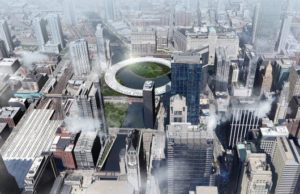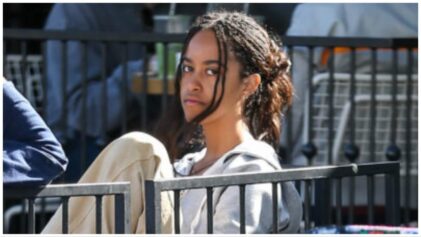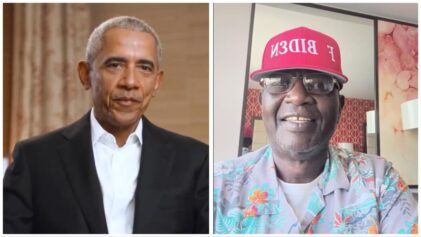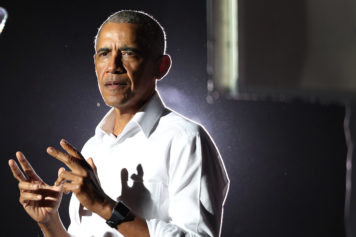
Winner / Zhu Wenyi, Fu Junsheng, and Liang Yiang of the fourteenth annual Chicago Prize Competition – The Barack Obama Presidential Library . Image Courtesy of Chicago Architectural Club
By Gus T. Renegade
Isabel Wilkerson’s “The Warmth of Other Suns” documents what it has meant to be white in Chicago (the world). When Black World War II veteran Harvey Clark Jr. rented an apartment in an exclusively white area in 1951, white “housewives and grandmothers in swing coats” terrorized his family. A white “mob stormed the apartment … burned the couple’s marriage license and the children’s baby pictures … bashed in the toilet bowl. They looted. Then they firebombed the whole building. The rioters overturned police cars and threw stones at the firefighters who were trying to put out the blaze.”
Chicago whites offered a similar welcome to gospel legend Mahalia Jackson’s acquisition of Windy City property.
This uncontested record of white terrorism targeting Black renters and property owners should heavily inform our analysis of Chicago land transactions. Such as this week’s announcement that the Barack Obama presidential library will be located on Chicago’s South Side. Illinois Congressman Bobby Rush – former Black Panther – believes this monument will be an “enormous opportunity for the surrounding economically distressed communities.” Recently re-elected Mayor Rahm Emanuel (former White House chief of staff to Obama) believes this will pay an economic and cultural dividend to the South Side and the city of Chicago. What could be dastardly about an estimated $600 million economic infusion into a historically Black section of town that inspired first lady Michelle Obama’s grandfather’s nickname?
Trojan Horse Press encourages suspicion of all whites bearing gifts. A Chicago resident and co-author of “Black Love Is a Revolutionary Act,” Pam Evans offered a warning about the proposed book depository months before Chicago claimed the prize. A previous failure revealed the future.
Former Mayor Richard Daly, Oprah Winfrey and many Chicagoans labored desperately to land the 2016 Olympics. They lost to Brazil. During this period, Evans observed the University of Chicago acquire large amounts of property in predominantly Black areas. Sam Cholke of DNAinfo reports that U. of C. has spent “more than $18 million to snap up 26 properties in the Washington Park neighborhood.” The university pitched the winning library proposal featuring the South Side’s Washington Park as one of two potential areas for the library; coincidentally, this area was also included in development proposals for the rejected Olympic bid.
A presidential library is a substantial consolation prize.
And possibly a covert means to continue the displacement of Chicago’s Black residents. Urban affairs analyst Aaron Renn considers that the 1999 “Plan for Transformation” housing rehabilitation project may have ejected a sizable portion of Black residents from the city. This corroborates Evans’ misgivings about the alleged windfall the library will yield for Black people.
Evans submits that one group who will undoubtedly gain from this venture is local construction companies. “The contracts … that go out for the construction. Union construction work that Black people can’t get. You see construction going on all over this city, and you hardly see any Black workers. So why all of a sudden are Black people going to benefit?”
Johns Hopkins University historian N.D.B. Connolly justifies Black apprehension of white treachery. His research on racial violence in Jim Crow America informs his conclusion that white folks have become “increasingly efficient” at confiscating Black property. White looters plundering a flourishing Black Tulsa is primitive. Seizing Black property for unpaid taxes is the evolution of white violence. The University of Virginia’s Andrew Kahrl confirms that white public officials across the United States have a history of relying on punitive “property tax assessments to relocate Black persons and liquidate Black property after other barriers had proven ineffective.”
Arnetha Gibson-Habeel feels she has been targeted for liquidation. She directs the R.T.W. Veterans Center – which is surrounded by city and University of Chicago land. She said the university inquired about purchasing her property in 2012. She declined. For her, the presidential library is a harbinger of doom. “If they get the library there,” she remarked, “we don’t have to talk about it, we’re done.”
Evans speculates that a racial cleansing would entail a combination of increased property taxes, evictions, razed houses and vouchers. The “Plan For Transformation” included vouchers that allowed – possibly encouraged – many Black Chicagoans to depart. Rutgers scholar Beryl Satter deconstructs decades of white tyranny and how it impacted her family. In 1958, her white father wrote that “exploitative sales were draining Black Chicagoans of one million dollars a day.” She shares this simile to illustrate the violence of white property owners and lenders: “It was like people who like to go out and shoot lions in Africa. It was the same thrill.”
Veronica Morris-Moore is a witness to Black Chicagoans being shot for white thrills. She is a South Side native, a member of Fearless Leading by the Youth, and has organized an unwavering campaign to prioritize constructing a trauma center before a library. Her position is that “if the city and the university could move mountains to bring the library to the South Side, they should sign a community benefits agreement that at the very least includes [a] trauma center that could save lives.” She insists that, “The people whose lives are being lost on the South Side due to gun trauma, due to economic violence, due to police violence will not be able to find much life-saving value in the presidential library.”
Conversely, Grammy-winning Chicago musician Rhymefest starred in a promotional rap video to demonstrate his value for the presidential library. Chicago native Sam Cooke’s 1962 smash “Bring It on Home to Me” plays in the background. Rhymefest believes that by choosing Chicago for the library, President Obama is paying homage to “the place that began [his] political career, that matured [him] not only as a man, but as a Black man.” He hopes the memorial will reduce crime and create economic and employment opportunities.
Evans’ concern is that, typically, when whites renew an “urban” area, they remove the blight and the Black. Even Linda Feldmann of The Christian Science Monitor acknowledges that with the presidential library, “anxieties come from the possibility of gentrification, in which current [Black] residents can be effectively forced out.”
Rhymefest’s optimism does not obstruct his comprehension that Black people don’t need a half-billion-dollar symbol; this library must help improve the safety and quality of life for South Side’s Black children. Dreams From My Father offers a succinct reminder that we must never deceive ourselves about Black progress or white power. “It was Blacks who could least afford such make-believe. Black survival in this country had always been premised on a minimum of delusions.”
As with the campaign to plaster Black liberator Harriet Tubman on the 20-dollar bill, white supremacy can camouflage with Black faces and names.


